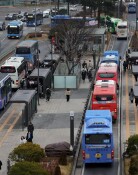Column, novel on nuclear bombings
Column, novel on nuclear bombings
Posted May. 30, 2013 06:43,
It was surprising to find that a major South Korean newspaper carried a column described the August 1945 atomic bombings of Hiroshima and Nagasaki as divine punishment. No wonder many Japanese as well as the victims were enraged.
If the bombings were divine punishment, why were there so many Korean victims of the bombings? What punishment was the Korean War in which the people of the same nation washed blood with blood, causing more casualties that the atomic bombings did? I wanted to ask such questions by instinct. There is no Gods will in people`s war. War is the ugliest act of the human race that left Gods hands, and the atomic bombings were its final destination.
What prompted the column was 731. A photo of Japanese Prime Minister Shinzo Abe, who posed inside an Air Self-Defense Force trainer jet plane numbered 731, provoked China and South Korea. It is a disgrace in Japans history that Unit 731 of the old Japanese army killed many people by conducting human experiments on prisoners of war in order to make biological and chemical weapons during the Second World War. But what was Abe thinking when he got on the plane numbered 731? Such a trend in South Korean media coverage of the news probably led to the column that called the atomic bombings divine punishment.
It is hardly possible that Abe or the Self-Defense Forces chose 731 on purpose or was ill-intended. I hope that people do not make a fuss over a coincidence. On the other hand, however, the Self-Defense Forces was so insensitive as to prepare a plane with that number. South Korea is overreacting to the number 731, while Japan is too insensitive. Such a gap symbolizes the two countries currently going crisscross.
Even so, the South Korea-Japan relations are too cold. Hopes that new governments of the two countries will rebuild the strained relationship have gone awry. The relationship has worsened since March, when I began to live in Seoul. Toru Hashimoto, co-leader of the Japan Restoration Party, made problematic remarks about the comfort women issue. This time, the atomic bombings column came out in South Korea.
South Korean news programs frequently air scenes of mean anti-Korean protests in Japan, which hate speeches are repeated. Japanese TV programs show provocative footages that South Korean protesters trample upon photographs of Prime Minister Abe and other Japanese politicians. By watching just those scenes, the situation resembles the eve of the beginning of a war.
Suddenly, I was reminded of The Mugunghwa Blossoms, Kim Jin-myeongs bestselling novel that was published in 1993. In the novel, South and North Korea jointly carry out a top-secret project to develop nuclear weapons. As Japan occupies Takeshima (Japanese name for Dokdo) militarily, they launch a nuclear missile toward an uninhabited Japanese island. The Mugunghwa Blossoms is a go sign for a nuclear attack. The shocking storyline became a topic in Japan, and the translated version of the book was published in Japan in the following year.
Although the story is absurd, I have realized that after reading it again, I have a slightly different sense of reality than before. First, the nuclear development, which I thought was unlikely, has become a reality. Though the two Koreas are not working together, North Korea is really repeating nuclear tests and ballistic missile launches. On the other side in the novel, Japan revises Article 9 of its constitution in the 1990s and became a military power. Although the reality is quite different, it is true that the Japanese prime minister have recently raised the banner of the constitutional revision and the establishment of national defense forces.
What about Takeshima? Territorial disputes between the two neighbors have been intensifying, escalating the atmosphere of a clash. The situation has finally led to exchanges of hatred between South Korea and Japan. When the novel came out in 1993, then Prime Minister Morihiro Hosokawa clearly apologized for Japans past during a summit with the then South Korean President Kim Young-sam. As the bilateral relations improved in the 1990s with the apology, the novel was regarded as anachronistic. But it seems that time has regressed now.
In retrospect, an enormous row broke out 31 years ago when I was studying in Seoul. As South Korean newspapers and television targeted Japan every day, denouncing it for distorting history in school textbooks, living in South Korea was difficult. There were restaurants and even taxis that hung signs saying No Japanese accepted. At bars, strangers yelled at me. As I begin my life in Seoul after a long time, I am in this situation. Sometimes, I even wonder if I am a bearer of misfortunes.
However, I am glad that South Koreans look much calmer than during that time. In Japan, most people are calmer than politicians.
As evidence to that, the popularity of Osaka Mayor Toru Hashimoto has plummeted since the remarks, with the Japan Restoration Party in a crisis. The atmosphere for a constitutional revision is not revived, and the excitement over Prime Minister Abe is cooling down little by little. Of course, no one is dreaming about using military force on Takeshima.
Both sides should not be blinded by extreme parts. Far from joint nuclear development by the two Koreas, what we should do now is for South Korea and Japan to jointly cope with North Koreas nuclear development. I have such thoughts strongly as I read The Mugunghwa Blossoms.
(Written by Yoshibumi Wakamiya, senior fellow of Japan Center for International Exchange and former Asahi Shimbun columnist)







